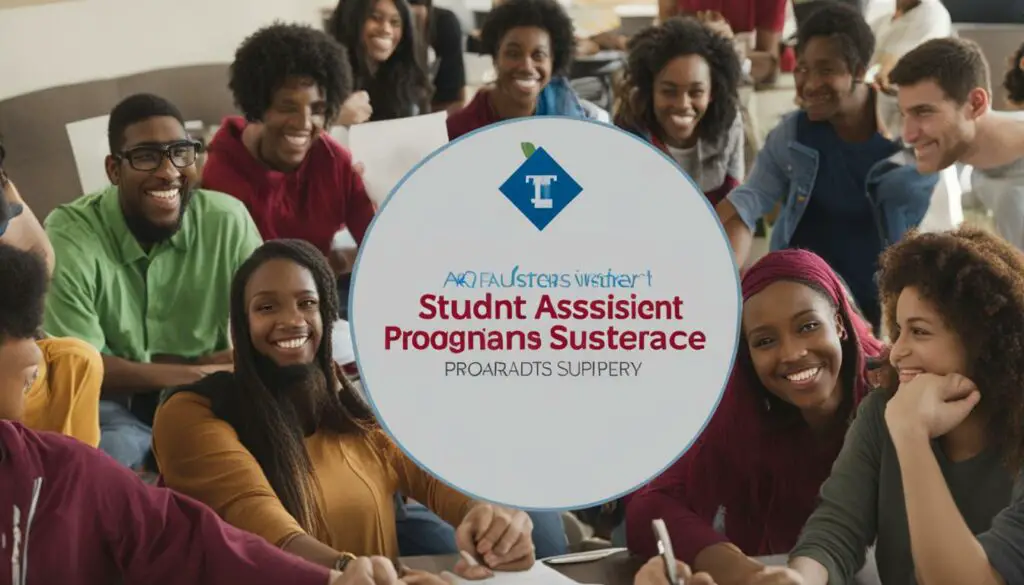Originally posted on November 19, 2023 @ 6:46 pm
College can be an exciting and rewarding experience, but it can also be financially challenging for some students. Many students struggle to make ends meet, especially when it comes to affording food. The good news is that food stamp benefits can provide financial help to students in need. But can students get food stamps? Let’s explore:
First, it’s important to understand that food stamp eligibility criteria and rules vary by state. However, in general, most students are eligible to receive food stamp benefits if they meet certain requirements. These requirements include:
- Being a U.S. citizen or legal immigrant
- Meeting income guidelines
- Working a minimum of 20 hours per week or being enrolled in a work-study program
- Being enrolled in college at least half-time
Additionally, some states have a specific food stamp program for students, which may have additional eligibility criteria.
It’s also worth noting that financial aid and food stamps may intersect. Many students who receive financial aid wonder if they are still eligible for food stamp benefits. The answer is yes! Receiving financial aid does not automatically disqualify a student from receiving food stamp benefits.
Table of Contents
Key Takeaways:
- Most students are eligible for food stamp benefits if they meet certain requirements
- Some states may have a specific food stamp program for students
- Receiving financial aid does not automatically disqualify a student from receiving food stamp benefits
Exploring Eligibility Criteria for Student Food Stamps

When it comes to food stamps for students, understanding the eligibility criteria is crucial. While students are generally not eligible to receive food stamps, there are certain circumstances in which they may qualify.
One crucial factor is the student’s income level. Students who earn less than the maximum allowable income for their household size may be eligible for food stamp benefits. Additionally, students who are responsible for caring for a child or a dependent may also qualify for food assistance.
It’s also important to note that there is a specific food stamp program available for students. The Student Food Stamp Program allows eligible students to receive benefits without having to meet the regular work requirements that other food stamp recipients must adhere to.
But what about students who receive financial aid? The relationship between financial aid and food stamps can be complex, but in general, receiving financial aid does not automatically disqualify a student from receiving food stamp benefits. However, it’s important to carefully consider all sources of income when determining eligibility.
To learn more about the specific eligibility criteria for student food stamps, visit the official website for the Supplemental Nutrition Assistance Program (SNAP).
Understanding the Application Process for Student Food Stamps

If you’re a student in need of food assistance, applying for food stamps can be a great option to help alleviate some of the financial burden. Here’s what you need to know about the application process for student food stamps.
Firstly, it’s important to note that there is a specific food stamp program for students known as the Supplemental Nutrition Assistance Program (SNAP). To be eligible for SNAP, you must meet certain criteria, including income limits and resource requirements. You can visit the USDA’s SNAP eligibility page for more information on these requirements.
To apply for student food stamps, you can start by visiting your state’s SNAP website or office. You may be required to provide personal identification documents, proof of income and expenses, and other additional information.
It’s also essential to remember that the application process can take some time, and it may take a few weeks before you receive your benefits. However, once you’re approved for food stamp benefits, your benefits are loaded onto a card that can be used at participating retailers to purchase eligible food items.
Additional Considerations for Student Food Stamp Applications
When applying for student food stamps, there are some unique considerations to keep in mind. For example, students who live off-campus may have different eligibility requirements than those who live on-campus.
Additionally, it’s worth noting that receiving food stamp benefits may impact your financial aid eligibility. However, it’s essential to remember that food stamp benefits do not typically count as taxable income, and therefore should not significantly affect your financial aid.
If you have any questions or concerns about the application process or your eligibility for food stamp benefits, it’s important to reach out to your state’s SNAP office for guidance and support.
Exploring Student Assistance Programs

As mentioned earlier, there are several student assistance programs available that can help students meet their basic needs. These programs are designed to support students who may be facing financial challenges, food insecurity, or other related issues.
What are Student Welfare Benefits?
Student welfare benefits are a type of government assistance that provides financial support to students in need. These benefits can include cash payments, food stamps, housing assistance, and more. The eligibility criteria for these benefits can vary depending on the state and the program.
Types of Student Assistance Programs
There are several types of student assistance programs available, including:
- Federal Work-Study Program: This program provides part-time jobs for undergraduate and graduate students who demonstrate financial need.
- Student Financial Aid: This program offers financial assistance to students who need help paying for their education, including grants, loans, and scholarships.
- Student Health Services: Many universities and colleges offer health services to their students, including mental health services, medical care, and counseling services.
- Food Assistance Programs: As discussed earlier, there are specific food assistance programs available for students who are struggling with food insecurity.
- Child Care Assistance: This program provides financial assistance to students with children who need help paying for child care services while they attend school.
The Importance of Government Assistance for Students
Government assistance for students is crucial in ensuring that all students have access to education and the resources they need to succeed. By providing financial support, food assistance, and other resources, these programs can help alleviate the financial burdens that many students face.
According to a report by the National Center for Children in Poverty, more than 50% of college students experience food insecurity, and nearly one in five students experiences homelessness. These statistics highlight the urgent need for government assistance programs that can support students in need.
Without these programs, many students may have to drop out of school or sacrifice their basic needs to continue their education. By providing support and resources, government assistance programs can help ensure that all students have an equal opportunity to succeed.
The Impact of Student Government Benefits on Food Stamp Eligibility

When it comes to determining eligibility for food stamps, student government benefits can complicate matters. While some forms of government assistance may disqualify students from receiving food stamp benefits, others may have no impact on eligibility.
Generally, need-based aid, such as federal work-study programs or subsidized loans, does not affect a student’s eligibility for food stamps. However, merit-based aid, such as scholarships or grants, may be considered income and could affect eligibility. It’s important for students to understand the guidelines and regulations regarding the impact of student government benefits on food stamp eligibility.
| Government Benefits | Impact on Food Stamp Eligibility |
|---|---|
| Need-Based Aid (e.g. Federal Work-Study Program, Subsidized Loans) | No Impact |
| Merit-Based Aid (e.g. Scholarships, Grants) | May Affect Eligibility |
It’s worth noting that even if a student’s government benefits impact their eligibility for food stamp benefits, they may still be eligible for other forms of government assistance. Programs such as the National School Lunch Program and the Special Supplemental Nutrition Program can provide additional food resources to students in need.
Overall, it’s crucial for students to understand the eligibility criteria and regulations surrounding food stamp benefits and student government benefits. By staying informed and exploring all available resources, students can best navigate the complex relationship between financial aid, student government benefits, and food stamp eligibility.
Understanding the Benefits of Student Food Stamp Program

The Student Food Stamp Program is a government assistance program designed to provide students with monthly financial assistance to help them purchase food. The program is open to eligible students who face financial difficulties and struggle to meet their nutritional needs.
The benefits of the student food stamp program are numerous. Firstly, it helps alleviate food insecurity among students, ensuring they have access to healthy and nutritious food. This, in turn, can improve overall well-being, academic performance, and mental health.
The program also helps students save money on food expenses, allowing them to use their limited financial resources towards other essential needs, such as housing or textbooks.
Moreover, the student food stamp program is specifically tailored to meet the unique needs of students. For instance, it takes into account the fact that students may not have regular or predictable income streams, making it difficult to budget for monthly expenses. As such, the program provides a consistent and reliable source of financial assistance to help students plan their expenses more effectively.
It is also worth noting that students who receive financial aid may still be eligible for food stamp benefits through the student food stamp program. This means that students can receive both types of assistance to better meet their basic needs.
Overall, the student food stamp program is an invaluable resource for students who may be struggling with food insecurity or financial difficulties. It not only provides them with essential financial support for food expenses but also helps them maintain their physical and mental well-being.
Exploring Other Government Assistance Options for Students
While food stamps are an important resource for students in need, there are other government assistance programs that can also provide support. These programs vary by state, but most offer a range of benefits aimed at helping students meet their basic needs and achieve their educational goals.
Student Welfare Benefits
Student welfare benefits are designed to provide financial assistance to students who are living in poverty. These benefits may include cash assistance, housing assistance, healthcare benefits, and more. Eligibility criteria vary by state, but students who meet certain income and residency requirements may be eligible for these benefits.
In addition to government-sponsored welfare benefits, many colleges and universities offer their own student assistance programs. These programs may provide additional financial aid, work-study opportunities, and other forms of support to students in need.
Student Government Benefits
Another source of government assistance for students is student government benefits. These benefits may include scholarships, grants, and other forms of financial aid. While receiving these benefits may impact a student’s eligibility for food stamps, they can also help students afford other necessities, such as textbooks or transportation costs.
Exploring Different Forms of Government Assistance for Students
There are a variety of government assistance programs available to students, ranging from financial aid to healthcare benefits. Some of the most common forms of government assistance for students include:
- Federal Pell Grants
- Work-Study Programs
- Student Loans
- Temporary Assistance for Needy Families (TANF)
- Supplemental Nutrition Assistance Program (SNAP)
- Medicaid
- Children’s Health Insurance Program (CHIP)
Students who are struggling to make ends meet should explore all of the government assistance programs available to them to find the resources they need to succeed.
Navigating Financial Aid and Food Stamp Eligibility

For many students, financial aid is crucial in helping them cover the costs of tuition, books, and living expenses. However, receiving financial aid may also impact a student’s eligibility for food stamp benefits.
Students who receive financial aid must still meet the eligibility criteria for student food stamps, which includes having a low income and limited resources. Financial aid is considered a resource, and depending on the amount received, it could potentially disqualify a student from receiving food stamp benefits.
It is important for students to understand the guidelines and regulations regarding financial aid and food stamp eligibility. In some cases, students may be able to adjust the amount of financial aid they receive to maintain their eligibility for food stamps.
Additionally, there are various student assistance programs available that can provide additional support for students in need. These programs can help cover the costs of basic necessities, such as housing and healthcare, and may also offer food assistance to eligible students.
| Financial Aid and Food Stamp Eligibility | Student Assistance Programs |
|---|---|
| Financial aid may impact a student’s eligibility for food stamp benefits. | Student assistance programs can provide additional support for students in need. |
|
|
Student welfare offices and financial aid departments on campus can provide additional information and guidance on navigating financial aid and food stamp eligibility. It is essential for students to understand their options and seek out available resources to ensure they receive the support they need.
Understanding Student Welfare Benefits

Student welfare benefits are an important source of support for students who may be struggling financially. These benefits are provided by the government to help students meet their basic needs and focus on their education. Eligibility criteria for student welfare benefits may vary depending on the program, but generally, students must demonstrate financial need and meet certain requirements to qualify.
Government assistance for students includes a variety of programs, such as food stamps, housing assistance, and healthcare benefits. These programs aim to provide students with the resources they need to succeed in their academic pursuits and achieve their career goals.
Types of Student Welfare Benefits
There are many different types of student welfare benefits available, each with its own eligibility criteria and benefits. Some of the most common student welfare benefits include:
| Program | Description |
|---|---|
| Food Stamps | Assistance with purchasing food for eligible individuals and families. |
| Housing Assistance | Assistance with paying rent or finding affordable housing options. |
| Healthcare Benefits | Assistance with paying for medical expenses, including insurance premiums and co-pays. |
| Scholarships and Grants | Financial assistance with tuition and other education-related expenses. |
| Work-Study Programs | Opportunities for students to work part-time on campus or in the community to earn money to offset their education expenses. |
Eligibility Criteria for Student Welfare Benefits
The eligibility criteria for student welfare benefits may vary depending on the program and state. However, most programs require students to meet certain basic requirements, such as:
- Be enrolled or accepted as a student at an accredited institution
- Be a U.S. citizen or legal resident
- Demonstrate financial need
- Meet certain income requirements
Additionally, specific programs may have additional eligibility criteria and requirements. For example, to receive food stamps, students must meet certain income guidelines based on household size and other factors.
The Importance of Student Welfare Benefits
Student welfare benefits play a crucial role in ensuring that all students have access to the resources they need to succeed. These programs can help alleviate financial stress and allow students to focus on their education and future careers.
By providing assistance with basic needs such as food, housing, and healthcare, student welfare benefits can help ensure that students have an equal opportunity to succeed regardless of their financial status.
In the next section, we will explore the different government assistance options available to students beyond food stamps and student welfare benefits.
Exploring Different Forms of Government Assistance for Students
When it comes to government assistance for students, there are various programs available that provide support for those in need. Here, we’ll take a closer look at the different forms of assistance that students can access to help them meet their basic needs and achieve their educational goals.
Student Welfare Benefits
Student welfare benefits are one type of government assistance that provides financial support to students. These benefits are designed to help cover the costs of living expenses, such as food, housing, and transportation. Eligibility criteria for these benefits vary depending on the state and program, but generally, students must be enrolled in a degree program and demonstrate financial need.
Examples of student welfare benefits include:
| Program | Description |
|---|---|
| School Lunch Program | A federally-funded program that provides free or reduced-price lunches to eligible students. |
| Temporary Assistance for Needy Families (TANF) | A program that provides financial assistance to low-income families with children. Students whose families receive TANF benefits may also be eligible for assistance. |
| Supplemental Nutrition Assistance Program (SNAP) | Formerly known as food stamps, this program provides low-income individuals and families with financial assistance for purchasing food. Eligible students can receive SNAP benefits to help with their food expenses. |
Student Government Benefits
Student government benefits are another type of assistance that can help students cover the costs of their education. These benefits may come in the form of scholarships, grants, or work-study programs. Eligibility criteria for student government benefits vary depending on the program, but often take into account academic performance, financial need, and other factors.
Examples of student government benefits include:
- Scholarships
- Grants
- Work-study programs
Students who receive government benefits may also be eligible for other forms of assistance, such as student welfare benefits or food assistance programs.
The Importance of Student Welfare Programs
As we have explored in previous sections, government assistance programs play a critical role in supporting students who face financial challenges. Student welfare benefits, student assistance programs, and other forms of government assistance can make a significant difference in the lives of students, ensuring they have access to basic needs like food, housing, and healthcare.
Beyond addressing immediate needs, these programs have a positive impact on students’ long-term academic success and overall well-being. When students feel supported and secure, they are better able to focus on their studies, participate in extracurricular activities, and build meaningful connections within their communities.
In particular, student welfare benefits provide essential support to students who may not have access to other sources of financial assistance. These benefits can help cover the cost of textbooks, transportation, and other expenses that can be significant barriers to academic success.
Student assistance programs also offer a range of resources and services to students, including academic advising, tutoring, and counseling. These programs can help students overcome academic challenges, develop new skills, and connect with peers who share similar experiences.
The importance of these programs cannot be overstated. By supporting students’ most basic needs, we can ensure they have the tools and resources they need to succeed academically and beyond.
Conclusion
After exploring the eligibility criteria, application process, and available assistance programs, it is clear that students can indeed get food stamps. Food assistance is a critical need for many students, and the government recognizes this by providing several programs to support them.
The student food stamp program is specifically designed to help eligible students access the resources they need to maintain a healthy diet. It is important to note, however, that students must meet the eligibility criteria established by the government to receive food stamp benefits.
Additionally, there are several other government assistance options available, including student welfare benefits and student government benefits. These programs can help students meet their basic needs and improve their quality of life.
It is essential to navigate the complex relationship between financial aid and food stamp eligibility to ensure students receive the support they need. Proper understanding of the guidelines and regulations can help students optimize their benefits and reduce any potential confusion.
In conclusion, yes, students can get food stamps, and there are several government assistance programs available to support them. It is crucial to take advantage of these resources to alleviate food insecurity and improve the overall well-being of students.
Can Students Get Food Stamps?
FAQ
Can students get food stamps?
Yes, students can be eligible for food stamps under certain conditions. There is a specific food stamp program available for students.
What are the eligibility criteria for student food stamps?
The eligibility criteria for student food stamps may vary, but generally, students must meet income and resource requirements, be enrolled in an eligible educational institution, and meet other specific criteria set by their state.
How do I apply for student food stamps?
To apply for student food stamps, you will usually need to contact your local Supplemental Nutrition Assistance Program (SNAP) office or apply online through the official SNAP website. The application process may require documentation of your student status and financial information.
Are there other government assistance programs available for students?
Yes, there are various government assistance programs available to support students in need. These programs can provide assistance with housing, healthcare, and other basic needs. It’s worth exploring all available options to find the support that best suits your situation.
How do student government benefits affect food stamp eligibility?
Student government benefits, such as scholarships or grants, may impact food stamp eligibility. The specific guidelines can vary, but generally, these benefits are considered when determining your income and resource eligibility for food stamps.
What are the benefits of the student food stamp program?
The student food stamp program can provide crucial support to students facing food insecurity. It helps ensure that students have access to nutritious meals, which can positively impact their overall well-being and academic success.
What other government assistance options are available for students?
In addition to food stamps, there are other government assistance options available for students. These programs may include housing assistance, healthcare benefits, and additional financial aid options. Exploring these resources can help students meet their basic needs and thrive in their educational pursuits.
How does financial aid affect food stamp eligibility?
Financial aid can impact food stamp eligibility, as it is considered when determining income eligibility. It’s important to understand the guidelines and regulations surrounding this relationship to ensure you receive the support you need.
What are student welfare benefits?
Student welfare benefits are government assistance programs designed to provide support to students in need. These benefits can include financial aid, housing assistance, healthcare benefits, and food assistance programs like food stamps.
What forms of government assistance are available for students?
Students may have access to various forms of government assistance, including student welfare benefits, financial aid, scholarships, grants, and other programs aimed at supporting their educational and basic needs.
Why are student welfare programs important?
Student welfare programs play a vital role in ensuring that all students have equal opportunities to succeed in their education. These programs help to address and alleviate barriers related to basic needs and contribute to students’ overall well-being.
See also:
Leave a Reply